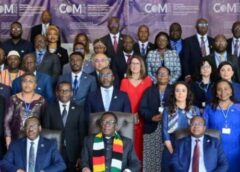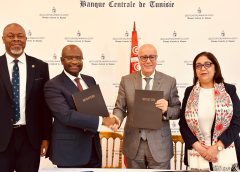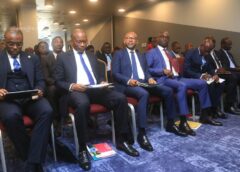Botswana’s President Duma Boko reaffirmed the strategic importance of the African Continental Free Trade Area (AfCFTA) in transforming intra-African trade and strengthening Africa’s position on the global economic stage. Speaking at the African Economic Conference in Gaborone, held from November 23 to 25, the president highlighted AfCFTA as a historic opportunity to reshape the continent’s economic landscape.
Jointly organized by the African Development Bank (AfDB), the United Nations Economic Commission for Africa (UNECA), and the United Nations Development Programme (UNDP), the conference gathers policymakers, economists, and experts under the theme: “Securing Africa’s Economic Future Amid Growing Uncertainty.”
A Shared Vision for Economic Integration
In his address, President Duma Boko described AfCFTA as “the largest free trade zone in the world” and emphasized its potential to transform Africa’s economy by boosting investments, creating jobs, and accelerating industrialization.
He underscored that regional cooperation must go beyond trade in goods and services and include broader initiatives, such as:
- Sharing physical infrastructure to enhance cross-border connectivity.
- Joint management of natural resources to ensure sustainable and equitable use.
- Peaceful conflict resolution to create a favorable environment for development.
Commitment to Free Movement
Claver Gatete, Executive Secretary of the United Nations Economic Commission for Africa (UNECA), called AfCFTA the “crown jewel” of Africa’s economic integration efforts. He urged for an accelerated implementation of the agreement to eliminate trade barriers and promote the free movement of people, goods, and services.
He also praised visa exemption policies adopted by countries like Botswana, Rwanda, and Ghana, which exemplify how African nations can remove obstacles to greater intra-African collaboration. These policies, he noted, are critical for strengthening economic and social ties across the continent.
Addressing Global Economic Uncertainty
The conference aims to tackle the growing challenges Africa faces in an increasingly uncertain global economic environment. Delegates are discussing concrete measures to:
- Diversify African economies.
- Build resilience to global crises.
- Mobilize both foreign and domestic investments in key sectors.
AfCFTA, encompassing 55 African countries with a combined market of 1.3 billion people, provides a unique lever to boost intra-African trade. Currently, only 15% of African trade occurs within the continent, compared to nearly 60% in Europe and 40% in Asia.
Building a Prosperous Future
As Africa seeks to navigate future challenges, AfCFTA represents an unprecedented opportunity to transform the continent into a competitive global economic powerhouse. With initiatives such as free movement, shared infrastructure, and reduced trade barriers, African leaders aim for sustainable and inclusive economic integration.
President Duma Boko concluded his remarks by calling for a strong collective will to realize the promise of AfCFTA. “This project is not just an economic milestone; it is a declaration of ambition for Africa’s future.”
With vibrant discussions and actionable proposals, the African Economic Conference stands as a pivotal moment in shaping the path toward a more integrated, prosperous, and resilient Africa.






